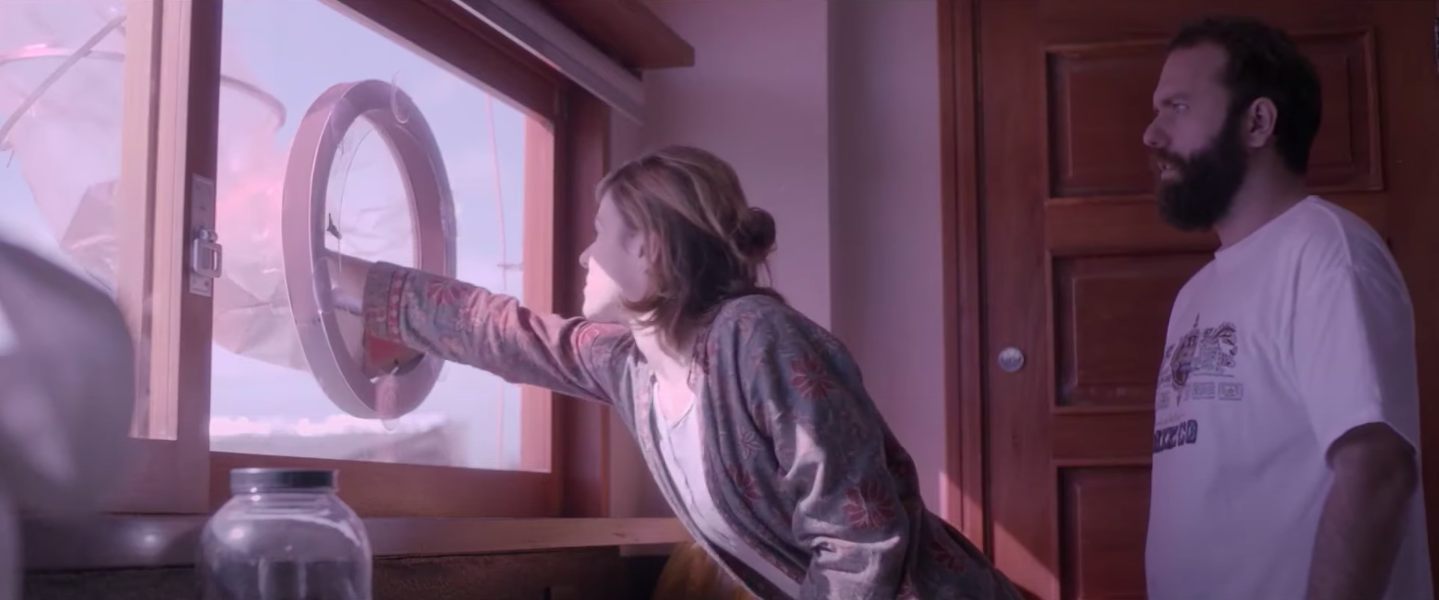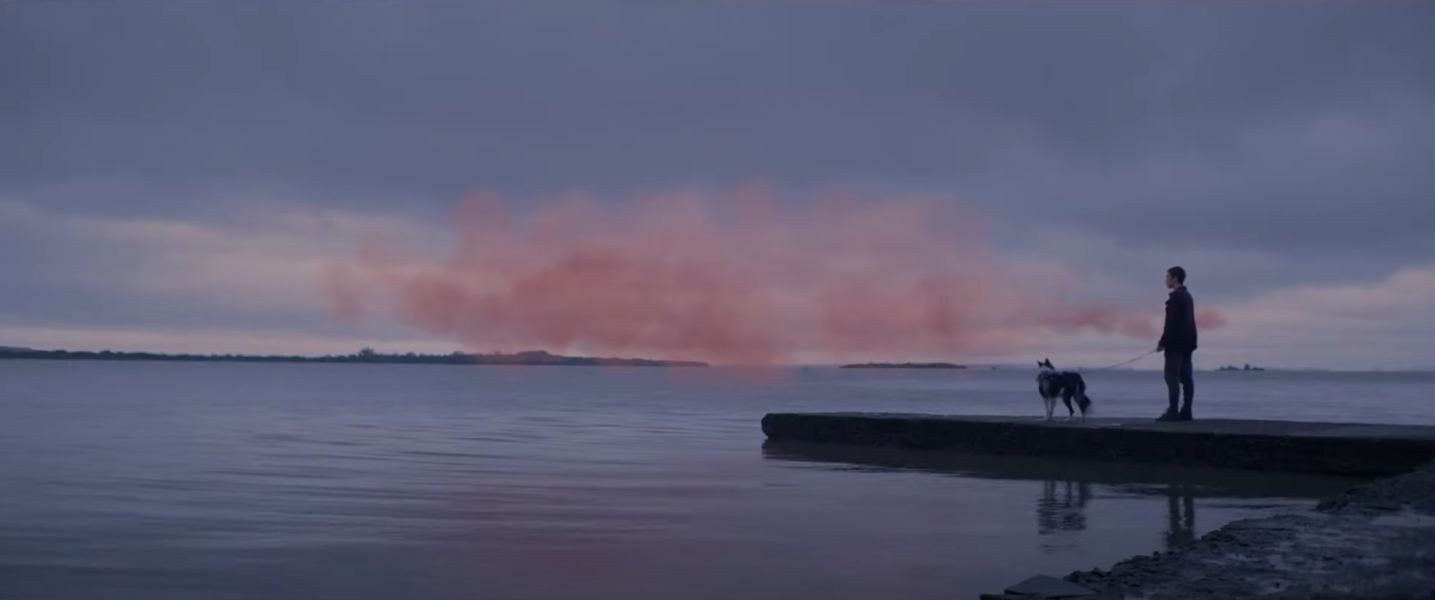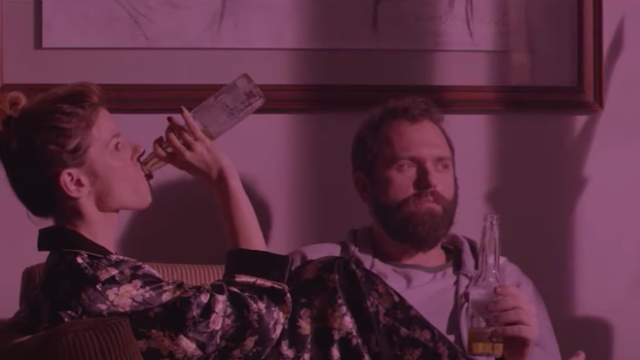The lengths that Iuli Gerbase’s The Pink Cloud goes to in order to show you parallels between its fictional story about quarantining and the countless tales of real people living through our ongoing covid-19 pandemic may strike you as excessive. It could also be seen as the movie’s attempt to tap into our reality just enough to get people buzzing about its premiere at this year’s Sundance film festival.
The disclaimer that appears at the start of the Brazilian film is neither of those things, though. As The Pink Cloud opens, you can see why Gerbase felt the need to grab people by the shoulders, look them directly in the eyes, and tell them that, for all of its different kinds of relatability, what unfolds between Giovana (Renata de Lélis) and Yago (Eduardo Mendonça) is a fiction that’s only rooted in reality. Despite that, the way the film’s narrative roots wrap themselves around your heart and begin feeding on your own experiences with plague-era isolation and disillusion make it hard not to become invested in Giovana and Yago’s new shared life together, which begins the morning a mysterious pink cloud materialises in the atmosphere and begins killing anyone outside who encounters it.
[referenced id=”1237143″ url=”https://gizmodo.com.au/2020/08/zombie-stories-are-going-to-have-to-change/” thumb=”https://gizmodo.com.au/wp-content/uploads/2020/08/05/xv1eglaegrfy6grimq5p-300×169.jpg” title=”Zombie Stories Are Going to Have to Change” excerpt=”At the core of every movie involving a zombie apocalypse is an idea about humanity’s drive to consume, or how easy it would be for civilisations to crumble in the midst of an unforeseen disaster. Like, for instance, the sudden spread of a deadly virus that swept its way across…”]
Even though Gerbase first conceived of the concepts at work in The Pink Cloud long before covid hit, the way the movie gently deploys ideas from other stories that fall under the plague apocalypse genre only adds to the overall impression that the movie sagely knew how many things in our 2020 and beyond have played out. When we’re first introduced to Giovana and Yago, the pair are as new to one another as we are to them and the cloud, which forces everyone across the globe to stay indoors where the gaseous entity does not seep for some inexplicable reason.
Even with the cloud itself and all its dread looming in the background, The Pink Cloud begins as a sort of rose-tinted story about the possibilities of a budding romance that comes after a one night stand. Though Giovana, a web designer, is a more cerebral, contemplative stranger to Yago, a chiropractor, the immediate intimacy between the two of them feels like the sparks of a passionate relationship. The cloud’s arrival, though, alters both their lives in ways they never could have anticipated as they, along with the rest of the world, settle into the reality that the cloud might not ever dissipate, forcing them to stay trapped for the foreseeable future.

Despite its small cast and even smaller number of locations where the movie was shot, The Pink Cloud paints a picture of the larger world beyond Giovana and Yago’s home that gives you a sense of how society adjusts to the cloud’s existence in ways that are both chilling and hopeful. The immediacy of the cloud’s arrival forces people to stay where they are the moment it first appeared. Through the internet, Giovana’s able to keep in contact with her sister, stuck at a sleepover with a few girlfriends and one of the kids’ fathers, and Yago keeps tabs on both his father and the old man’s now live-in nurse. You can see the uneasy new normal that everyone settles into while the cloud’s mysteries go unexplained.
The Pink Cloud’s shift into what might be considered horror territory comes as a logical progression of the quiet, foreboding undercurrent running through the film’s first third. But the horror doesn’t come by way of some dark turn towards the psychological or the sudden reveal of a nefariousness lurking in Giovana or Yago. Instead, the story forces you to sit with the couple, but Giovana most prominently, as a deep, existential malaise settles over them and brings out unexpected elements of their honest selves. Easy as it would be to cast Giovana as the “hero,” de Lélis embodies her with a persistent aloofness that makes her, in turns, both sympathetic and someone you wouldn’t necessarily want to spend your life with.

Deftly executed as Giovana and Yago’s growth is, one of the few moments where the movie stumbles comes as it addresses the understandable idea of people questioning whether to actually believe in the cloud. Regardless of Gerbase’s intentions and the film’s text, The Pink Cloud premieres at Sundance at a time when a real pandemic is ongoing, and efforts to vaccinate people are being hamstrung by a number of factors — including scepticism being encouraged by bad-faith actors. Those realities aren’t things that Gerbase could have truly predicted, but between the things that the film does get devastatingly right, and the fact that art cannot exist in a vacuum, no amount of disclaimers are really going to be enough for people not to project their current circumstances onto the film.
None of that is ultimately a knock against the film’s strengths, like the way both its story and its visuals linger as the credits begin rolling. Bruno Polidoro’s sublime cinematography uses The Pink Cloud’s filter as a way to find beauty and expansiveness in Giovana and Yago’s physically small lives, which are moving to watch as they intertwine and unravel. By the time The Pink Cloud is available to the public, we can only hope that it won’t hit nearly as close to home as it does now, presumably because we’ll have gotten the virus plaguing us all under control. If not, though, The Pink Cloud’s going to be a strong voice in the oncoming wave of covid-era works of art.
[referenced id=”1527266″ url=”https://gizmodo.com.au/2020/11/ben-wheatleys-pandemic-era-indie-horror-film-is-about-a-pandemic/” thumb=”https://gizmodo.com.au/wp-content/uploads/2020/11/07/de3ovsio2h76kvo51ug3-300×169.png” title=”Ben Wheatley’s Pandemic-Era Indie Horror Film Is About…a Pandemic” excerpt=”Though most of Hollywood ground to a halt during the ongoing covid-19 pandemic, High Rise director Ben Wheatley was apparently out in the wild finishing up In the Earth, his new film whose story is quite obviously meant to be a reflection of the current state of the world.”]
